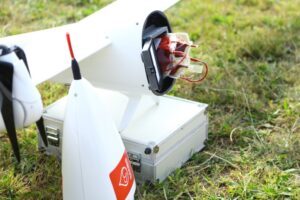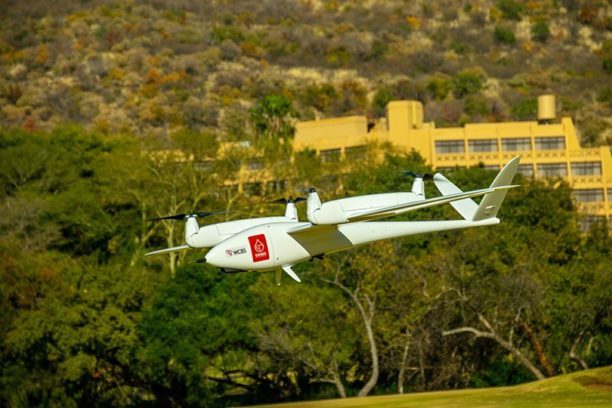
“In the event of a pandemic, a few hours may have a major influence on the development of the chain of infection,” says the company press release. “I am concerned about the individual behind each sample and the well-being of the patient in terms of the quality and speed of the findings,” says Marc Becker, M.D. “In this particular case, however, it is also about reducing risks for the many people involved in the provision of our laboratory services, such as doctors, courier services and assistants.”
Transport by drone has proven to be 8 to 12 times faster than traditional methods. “During a test flight, the autonomously operated Trinity F90+ drone from Quantum-Systems transported 20 sample tubes in less than seven minutes over the 6.4 km1 flight distance from Theresienwiese to the laboratory in Frührichstraße,” says the press release. Couriers who usually transport by van report that under normal traffic conditions in Munich, the trip takes an hour or more.
Even more importantly during the current pandemic, the drone delivery system is contactless. Robert Hirt, Chief Digital Officer, laboratory Becker & Kollegen says: “As part of our vision of a No-Touch Sample Distribution (NTSD), our initiative with Quantum-Systems makes an important contribution to the discussion on how we can use automation and digital technology to further reduce analog touch points and the associated potential danger to humans”.
While the technology is ready to implement drone delivery on a wide scale, says Quantum, the regulatory environment is not. Federal Minister of Transport Andreas Scheuer presented his drone action plan at a press conference last month, saying that the agency would release targeted funding for the development of drone technology in Germany, and would look at regulations – especially in light of new EU drone regulation scheduled for implementation in the beginning of 2021.
Miriam McNabb is the Editor-in-Chief of DRONELIFE and CEO of JobForDrones, a professional drone services marketplace, and a fascinated observer of the emerging drone industry and the regulatory environment for drones. Miriam has penned over 3,000 articles focused on the commercial drone space and is an international speaker and recognized figure in the industry. Miriam has a degree from the University of Chicago and over 20 years of experience in high tech sales and marketing for new technologies.
For drone industry consulting or writing, Email Miriam.
TWITTER:@spaldingbarker
Subscribe to DroneLife here.
